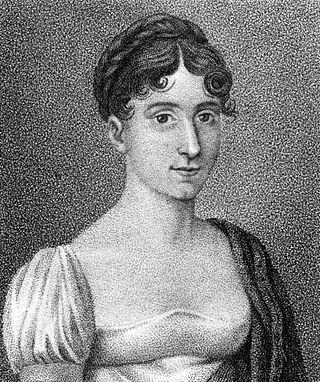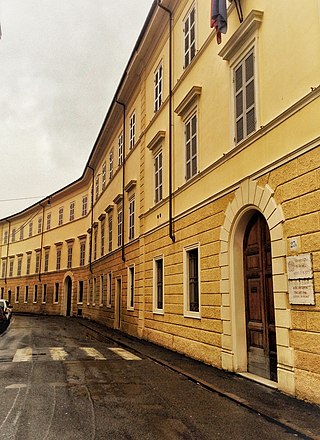Joachim Albertini or Gioacchino Albertini was an Italian-born composer, who spent most of his life in Poland. His opera Don Juan albo Ukarany libertyn was performed in the 1780s with both Italian and Polish libretti.

Gialdino Gialdini was an Italian composer and orchestra conductor.

Margherita Gonzaga was Duchess of Lorraine from 1606 until 1624 by marriage to Henry II, Duke of Lorraine. She was an agent of Pro-French and anti Protestant policy in Lorraine, and is most known for her support of her daughter Nicole's right to the Duchy of Lorraine. She also claimed her right to Monferrato during the Mantuan war of succession.

Guglielmo Zuelli was an Italian composer, conductor, and music educator. As a composer he achieved fame for his first opera Fata del Nord which premiered in Milan in 1884. Both his first and second opera, Mokanna o Il profeta del Korasan, were published by Casa Ricordi. However, his second opera has never been performed. His other compositions consist of several sacred choral works and a number of symphonic pieces written in a style similar to his contemporaries Giacomo Puccini, Alberto Franchetti, and Pietro Mascagni.

Giuseppe Dell'Orefice born in Fara Filiorum Petri, province of Chieti, was an Italian composer, and conductor best-remembered for his opera Romilda de'Bardi. He died in Naples.

Sì is an operetta in three acts composed by Pietro Mascagni to a libretto by Carlo Lombardo with verses by Arturo Franci. The libretto is based on Lombardo's operetta La duchessa del Bal Tabarin and Felix Dörmann's libretto for Majestät Mimi set by Bruno Granichstaedten in 1911. Mascagni's only venture into operetta, it premiered on 13 December 1919 at the Teatro Quirino in Rome. The operetta takes its name from its central character, Sì, an actress at the Folies Bergère, so called because she could never say no.

Serafino Gentili was an Italian opera singer particularly known for his performances in tenore di grazia roles. He sang in opera houses throughout Italy as well as in Paris and Dresden. During the course of his career, he created the role of Lindoro in Rossini's L'italiana in Algeri as well as leading roles in several other operas by less well-known composers. In his later years, he went by the surname Gentili-Donati to distinguish himself from the tenor Pietro Gentili.
Vincenzo Galli was an Italian opera singer and impresario. Considered an outstanding basso buffo singer, he created many roles on Italian stages, including in two of Donizetti's operas: Ivano in Otto mesi in due ore and Cesare Salzapariglia in Le convenienze ed inconvenienze teatrali. Luigi Ricci composed the role of Michelotto in his opera Chiara di Rosembergh specifically for Galli's voice.

L'avaro, is an opera in three acts composed by Pasquale Anfossi. The libretto by Giovanni Bertati is based on Molière's 17th-century comedy The Miser. Considered one of Anfossi's best operas, it premiered at the Teatro San Moisè in Venice in the autumn season of 1775 and was subsequently performed throughout Italy and in other European cities.
Rodolfo Ferrari was an Italian conductor.
Giuseppe Ferdinando Brivio was an Italian composer, conductor, violinist, and singing teacher who is chiefly known for his operas. His work displays a natural expression and uses figurations similar to that of Antonio Vivaldi.

Sebastiano Biancardi, known by the pseudonym Domenico Lalli, was an Italian poet and librettist. Amongst the many libretti he produced, largely for the opera houses of Venice, were those for Vivaldi's Ottone in villa and Alessandro Scarlatti's Tigrane. A member of the Accademia degli Arcadi, he also wrote under his arcadian name "Ortanio". Lalli was born and raised in Naples as the adopted son of Fulvio Caracciolo but fled the city after being implicated in a bank fraud. After two years wandering about Italy in the company of Emanuele d'Astorga, he settled in Venice in 1710 and worked as the "house poet" of the Grimani family's theatres for the rest of his career. In addition to his stage works, Lalli published several volumes of poetry and a collection of biographies of the kings of Naples. He died in Venice at the age of 62.
Giuseppe Badiali was an Italian painter and scenic designer.
Giovan Gualberto Brunetti was an Italian composer.

Maria Ester Mombelli was an Italian opera singer particularly known for her performances in operas by Rossini and Donizetti. She sang both soprano and mezzo-soprano roles, and often sang with her younger sister Anna.

Enrico Crivelli was an Italian opera singer who sang leading baritone and bass-baritone roles in the major opera houses of Italy as well as in Spain, Russia, Germany, France, and England. He also composed collections of art songs and published two books on the art of singing. He was born in Brescia, the youngest son of the celebrated tenor Gaetano Crivelli and died in Milan after a career spanning almost 30 years.

Angelo Maria Ripellino was an Italian translator, poet, linguist and academic.

The Conservatorio di Musica Arrigo Boito, better known in English as the Parma Conservatory, is a music conservatory in Parma, Italy. It was originally established as the Regia Scuola di Canto, a school for singing in 1819 by Marie Louise, Duchess of Parma, and expanded into a conservatory of music in 1825. In 1840 instrumental music instruction began, followed by the addition of music composition, conducting, and other musical studies.
The Conservatorio di Musica Alessandro Scarlatti, better known in English as the Palermo Conservatory, is a music conservatory in Palermo, Italy. One of the oldest music schools in Italy, the organization was originally established as an orphanage for boys known as the Orfanotrofio del Buon Pastore in 1618. Music instruction began at the school in the late 17th century, and for a limited period music was the primary emphasis of the school when it was known as the Conservatorio dei giovanetti dispersi. It evolved into a liberal arts college, known as the Collegio dei giovanetti dispersi, with an emphasis on literature and writing during the first half of the 18th century. In 1747 an emphasis on music resumed, and not long after the school was renamed the Collegio musicale del Buon Pastore. It operated under that name until 1915 when the school's name was changed to the Conservatorio di Musica Vincenzo Bellini. In 2018, the school's name was changed once again in honor of the composer Alessandro Scarlatti.
Magda Piccarolo was an Italian soprano and voice teacher. Active as an opera singer from 1933 through 1959, she was particularly celebrated for her portrayal of Gilda in Giuseppe Verdi’s Rigoletto. She later was active as a teacher of singing both privately and at the Milan Conservatory.












